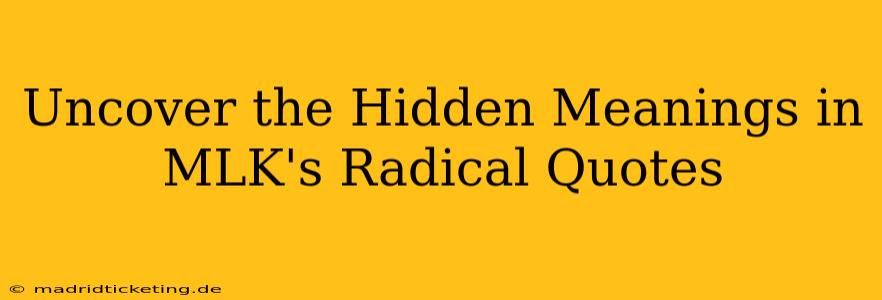Martin Luther King Jr.'s legacy extends far beyond his iconic "I Have a Dream" speech. His words, often deceptively simple, contained layers of meaning that continue to resonate and challenge us today. This exploration delves into some of his most radical quotes, uncovering the profound truths hidden within their seemingly straightforward phrasing. We'll examine the context, the intended audience, and the enduring relevance of his powerful message.
What did MLK mean by "Injustice anywhere is a threat to justice everywhere"?
This quote, perhaps one of his most enduringly impactful, speaks to the interconnectedness of global justice. King wasn't merely advocating for localized solutions to specific problems; he was arguing for a universal commitment to human rights. For him, the oppression faced by African Americans in the US was inextricably linked to injustices around the world – from apartheid in South Africa to colonialism in various parts of the globe. Ignoring injustice anywhere, he argued, allowed it to fester and ultimately threatened the very fabric of justice everywhere. This principle calls us to action, demanding that we actively confront injustice wherever it manifests, recognizing our shared humanity and responsibility.
How did MLK's call for "nonviolent resistance" impact the Civil Rights Movement?
King's philosophy of nonviolent resistance wasn't passive; it was a powerful strategy demanding courage and discipline. It wasn't simply about avoiding violence; it was about actively opposing injustice with love and peaceful means. He understood the psychological impact of nonviolent resistance, forcing the oppressor to reveal their true nature to the world. The images of peaceful protestors facing brutal police violence became powerful tools in swaying public opinion and putting pressure on the government to enact change. King's strategy wasn't just effective; it was a testament to his belief in the transformative power of love and forgiveness.
What is the significance of MLK's statement, "Our lives begin to end the day we become silent about things that matter"?
This powerful statement emphasizes the importance of speaking truth to power. Silence, King implies, is complicity. By remaining silent in the face of injustice, we not only fail to support those who are oppressed, but we also allow the injustice to perpetuate and thrive. King’s words serve as a call to action, urging each of us to use our voices to advocate for what is right, regardless of personal risk or potential consequences. His call to action isn't just about grand gestures; it's about the small, everyday acts of speaking out against injustice wherever we encounter it.
Why did MLK believe that "The ultimate measure of a man is not where he stands in moments of comfort and convenience, but where he stands at times of challenge and controversy"?
This quote speaks to the inherent hypocrisy of convenient morality. True character, King argues, isn't revealed in times of ease but rather in moments of adversity. It's when faced with challenges and controversy that our true beliefs and values are tested. The quote challenges us to examine our own actions, questioning whether we truly stand for our principles when it's difficult or unpopular to do so. This resonates with his personal experiences during the Civil Rights Movement, where he repeatedly faced threats and hardship yet remained steadfast in his commitment to justice.
Does MLK's emphasis on "love" as a revolutionary force hold relevance today?
King's unwavering belief in the power of love as a revolutionary force is perhaps the most radical aspect of his message. Love, in his context, wasn't simply a feeling; it was an active force capable of transforming society. It was a commitment to understanding, compassion, and forgiveness, even in the face of immense hatred and oppression. This approach, in today's often polarized world, remains revolutionary. King's legacy challenges us to confront hatred not with more hatred, but with a commitment to love, understanding, and reconciliation. It’s a radical idea, but one that remains powerfully relevant.
King's radical quotes weren't just words; they were a blueprint for social change, a testament to the enduring power of courage, conviction, and love. Their enduring relevance serves as a potent reminder that the struggle for justice is ongoing, and that each of us has a crucial role to play in continuing his legacy.

